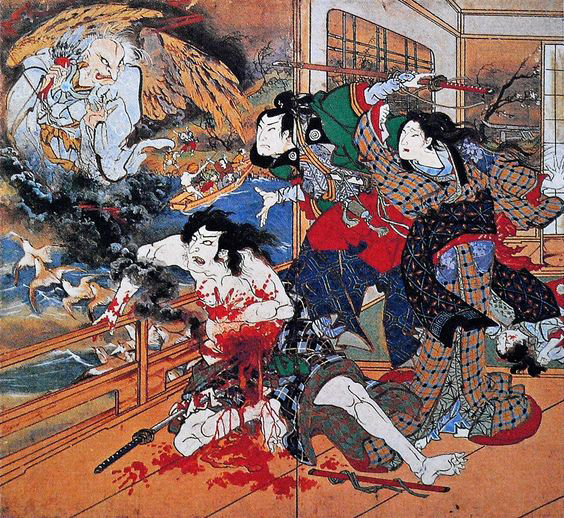| FUTAGO SUMIDAGAWA |
| Play title | Futago Sumidagawa |
| Author | Chikamatsu Monzaemon |
| History |
"Futago Sumidagawa" was premiered in the 8th lunar month of 1720 in ďsaka at the Takemotoza. It was never adapted to Kabuki during the Edo period but was still occasionally performed in Bunraku. It was adapted to Kabuki by Ichikawa Ennosuke III and staged for the first time in October 1976 at the Shinbashi Enbuj˘. |
| Structure |
The original drama was in 5 acts. |
| Key words |
Ennosuke Jűhachiban Ennosuke Shijűhassen Fukkatsu T˘shi Ky˘gen Jűhachiban Giri/Ninj˘ Hanyű-mura Hitokai Jidaimono Ky˘ran Ky˘ranmono Matsu Michiyuki Omamori Seppuku Shim˘sa Sumidagawa Sumidagawamono Sumidagawa (N˘) Tengu Yanagi |
| Summary |
Shim˘sa Hanyű-mura S˘ta sumika Sarushima S˘ta, a former samurai of the Yoshida household who was banished by his master, lives with his wife Karaito in the Hanyű village in the province of Shim˘sa. He works as a human-trafficker (hitokai). One day he buys a young boy and sells two young girls, whom he has been keeping in his house. Hanewana no Yaz˘, another human trafficker, brings a 12-year-old boy named Umewakamaru. He is of noble birth. S˘ta has previously asked Yaz˘ to sell this boy for 10 ry˘ to a customer in the distant Hachij˘ Island. Yaz˘ takes his leave after telling S˘ta that he could not sell the boy because he is too disobedient. Angry with this unruly child, S˘ta threatens to kill him with his sword. His wife, however, takes the sword from him and appeals to him to pardon the boy, but S˘ta continues to torment him. He beats Umewakamaru so hard that the boy dies after expressing his strong desire to see his mother again. Before dying, Umewakamaru asks to be buried under a willow tree (yanagi) with his omamori on his body. Immediately after the boy's death, Agata Takekuni, a former samurai of the befallen Yoshida household in Ky˘to, visits the house and, after identifying S˘ta as Awaji Shichir˘, who used to serve the Yoshida household, says that he is looking for his former master's missing son, Umewakamaru. Shichir˘ admits that he has just killed Umewakamaru without being aware of the fact that the boy was his former master's son. Then Shichir˘ takes out a huge amount of gold coins from the ceiling, a spectacular rain of gold, saying that he has been keeping them concealed in order to offer them to his former master as an indemnification for the money he has stolen in the past. Only 10 ry˘ are missing, the 10 ry˘ he had expected to receive after selling Umewakamaru. By way of apology, he suddenly commits seppuku, declaring that he hopes to become a tengu in order to help the survivors of the Yoshida household. Sumidagawa Ky˘jo Michiyuki Going crazy because of the missing of her son Umewakamaru, Hanjo Gozen wanders around the country in search of her son. H˘kaib˘, a Buddhist priest, tries to bring her to her senses with his prayer but in vain. The woman operating a ferry on the Sumida River offers a ride on her boat to Hanjo Gozen free of charge. Noticing two mounds on the other side of the river respectively planted with a pine (matsu) and a willow (yanagi), Hanjo Gozen asks the boatwoman what they are. The boatwoman, who happens to be Karaito, explains that the mound with the pine tree is the tomb of her late husband and that the one with the willow tree is the tomb of a young boy whom his husband has killed. Informed further that the boy's name is Umewakamaru, Hanjo Gozen hurries out of the boat and, lying face downward on her son's tomb, weeps bitterly. Umewakamaru's ghost appears only to disappear soon. A disappointed Hanjo Gozen tries to throw herself into the river when a tengu, the incarnation of Awaji Shichir˘'s spirit, descends from the sky, carrying with him Matsuwakamaru, Umewakamaru's twin brother, who has also been missing. He hands Matsuwakamaru to his mother to make them have a happy family reunion. |
 |
|
A by˘bu made by Hirose Kinz˘ depicting the drama "Futago Sumidagawa" |
|
|
| Contact | Main | Top | Updates | Actors | Plays | Playwrights | Programs | Links | FAQ | Glossary | Chronology | Illustrations | Prints | Characters | Derivatives | Theaters | Coming soon | News |